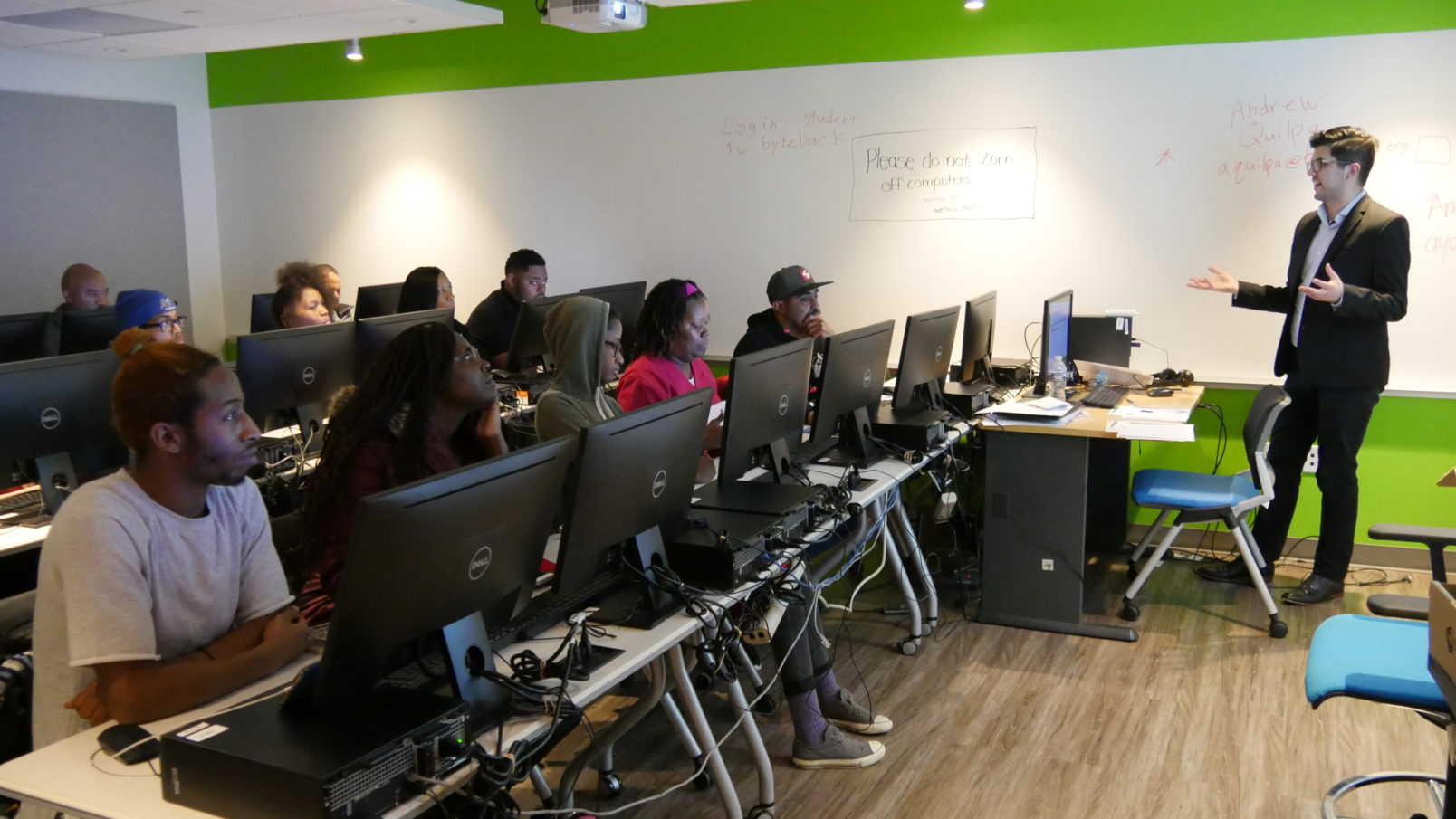What does the digital divide look like on the ground in D.C.? What would D.C. look like if there was digital equity? Are we on the right path? Do we need to dedicate more time, energy and money to it?
Spoiler alert: Yes, yes we do.
Last week, Byte Back, the D.C.-based tech inclusion nonprofit, and the Coalition for Non-profit Housing and Economic Development (CNHED) hosted the event “Digital Inclusion NOW: A Pathway to Economic Mobility for Black and Brown DC Residents.”
“People understand that digital access is essential to survive and thrive today,” said Byte Back CEO Elizabeth Lindsey during the event. But we don’t always realize the extent it’s needed.
The digital divide has had a disproportionate impact on communities of color due to systemic racism. It will take all of us — nonprofits, government, employers, and residents — to move toward “digital justice,” a term used during the event by Nicol Turner Lee, senior fellow and director of the Center for Technology Innovation at the Brookings Institution.
“When I think about the digital divide, I think about this whole concept of digital justice,” Turner Lee said. “It is actually critical to every factor of society in ways that are changing and transforming how we live, how we learn, how we earn, and how we engage in public discourse.”
Black and Brown people who try to enter tech careers face an additional gap.
“I’ve experienced how Black and Brown people are ostracized. It seems like there are criteria just for us,” said Tolya Elliott Chandler, a Byte Back student preparing for her CompTIA A+ certification. “Having Byte Back has made me less fearful of my future, especially during this pandemic.”
Anne Marie Bairstow, director of Skyland Workforce Center, echoed this: “I see how the participants at Skyland are left out because of lack of computer skills, computer access and the confidence to go in and use a computer.”
Of course, COVID-19 has widened the digital divide. While children in DC Public Schools have become better equipped with the Office of the Chief Technology Officer’s Internet for All initiative, many adults, especially people of color, are still left behind. Only 5% of white households in D.C. do not have access to high-speed internet, while 27% of Black, Latinx and Asian households don’t have access.
Lindsey Parker, D.C.’s chief technology officer, spoke about the increasing risk of ignoring the digital divide. Her office is currently launching a new cross-sector initiative called Tech Together, though the District eliminated funding this year for OCTO’s digital inclusion program Connect.DC.
“City use of technology that doesn’t center equity can actually exacerbate divides because of the digital divide,” said Alena Stern, data science fellow at The Urban Institute.
The panelists emphasized the need for all types of entities in D.C. to work on this together.
“We need economic policy that includes small business voices that are usually excluded because of digital gaps,” Stern added.
Today, the digital skills gap in Washington, D.C., is impacting how we work and who gets to work. The picture is not all bleak, though — digital inclusion also means having a way to recognize and utilize the expertise and skills people already bring to the table, said Amanda Bergson-Shilcock of National Skills Coalition.
Raymond Bell, founder of the H.O.P.E. Project in D.C. urged employers to get more involved in bridging the gap.
“What I would love for them to do more,” he said, “is to become bigger advocates when it comes to the Council and the Mayor’s office.”
Digital inclusion isn’t just nice, it’s essential.
“We see digital inclusion as a game changer across the D.C. region,” said Stephen Harrington, director of engagement and external affairs at the Greater Washington Partnership. As D.C. works to rebuild the economy amid the pandemic, investing in digital inclusion will help D.C.’s economic viability while also helping Black and Brown residents build the wealth they deserve.
“Our mission directly aligns in support of making digital inclusion the standard,” said Evette Banfield, VP of economic development and wealth building strategies at CNHED and one of the organizers of the event. She’s one of many local advocates who have recently started supporting digital inclusion for the workforce.
“When we talk about tech spaces and the opportunities within tech companies, there isn’t a lot of diversity,” said Melissa Stallings, Byte Back chief program officer. “I look at our students and they are motivated, they’re excited about gaining these new skills, they’re excited about what the opportunities are.”
###
It’s time to get involved in the solution — as employers, as a government, and as residents. That means you, #dctech companies. You will benefit from a technologically skilled workforce, so it’s time to help advocate for digital equity:
- Sign up here to support future digital equity advocacy with Byte Back and CNHED.
- To support Byte Back, to partner, or to register for classes, visit us at our new website.
- Help build awareness about the connection of racial equity and digital equity in your workplace. If your company has proclaimed that “Black Lives Matter,” how can they support digital equity for Black residents?
- For internet and technology access resources, visit Capital Clubhouse.
Watch the full event here:







